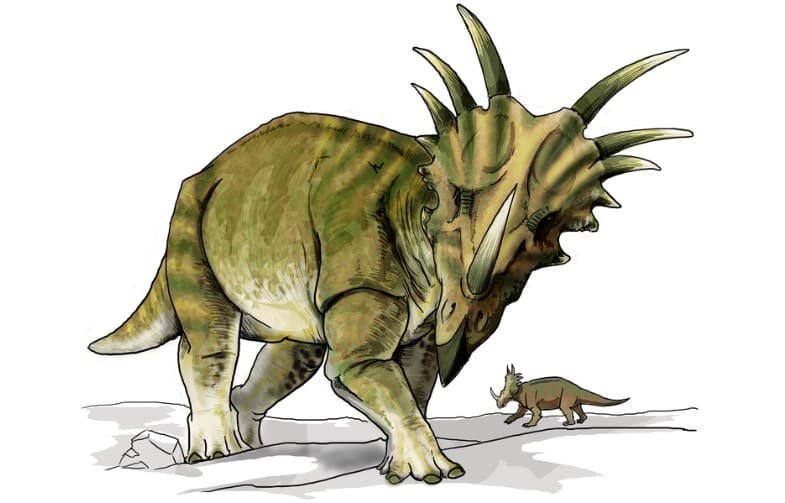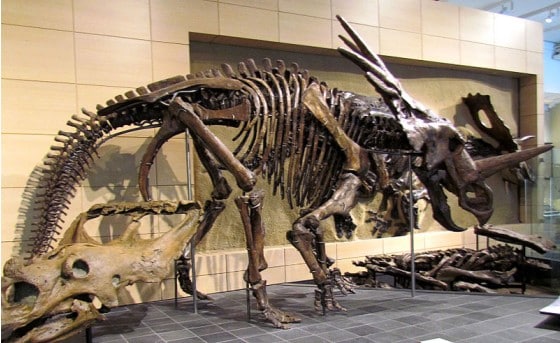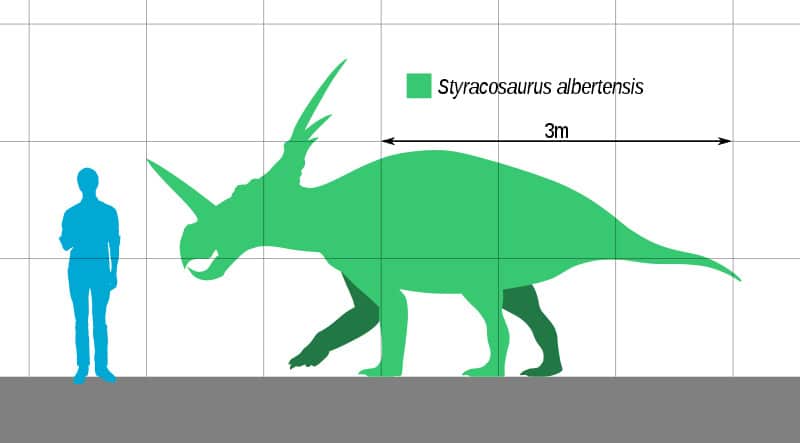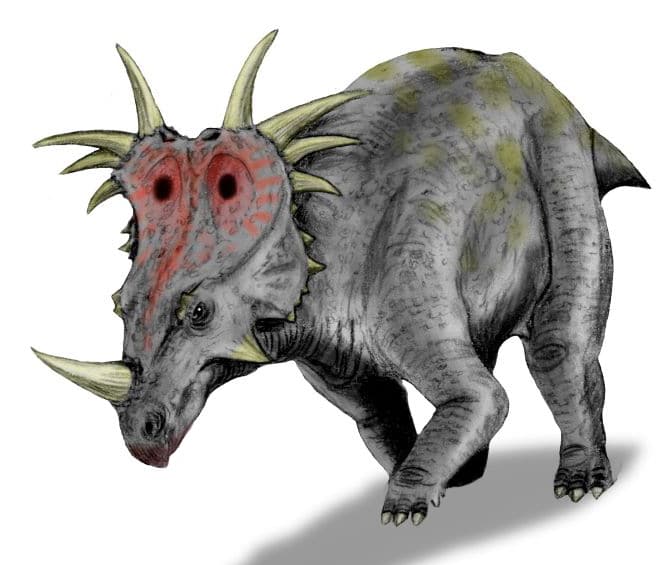Among its Cretaceous peers, the Styracosaurus holds a unique place. This dinosaur, whose name translates to ‘spiked lizard’, is a testament to the diversity and complexity of life on Earth millions of years ago. Its distinctive frill adorned with long spikes and the single horn on its snout make it an unmistakable figure in the world of paleontology.
The Styracosaurus is a symbol of the intricate interplay between form and function, a creature perfectly adapted to its environment and lifestyle. Its striking appearance is not just for show; every feature has a purpose, contributing to its survival in the harsh and competitive world of the Cretaceous period.
Styracosaurus Key facts
| Keyword | Fact |
|---|---|
| Styracosaurus pronunciation | sti-RAK-o-SAWR-us |
| Meaning of name | Spiked lizard |
| Group | Ceratopsians |
| Type Species | Styracosaurus albertensis |
| Diet | Herbivore |
| When it Lived | 83.5 to 70.6 MYA |
| Period | Late Cretaceous |
| Epoch | Late/Upper Campanian |
| Length | 18.0 ft |
| Height | 6.0 ft at hips |
| Weight | 33.0 tons |
| Mobility | Moved on all four |
| First Discovery | 1913 by Lawrence Lambe |
| Location of first find | Alberta, Canada |
| First Described by | 1913 by Lawrence Lambe |
| Holotype | CMN 344 |
Styracosaurus Origins, Taxonomy and Timeline

The Styracosaurus, or ‘spiked lizard’, derives its name from the Greek words ‘styrax’, meaning spike, and ‘sauros’, meaning lizard. This name is a fitting description of its most distinctive feature–a large frill adorned with long spikes.
Belonging to the group Ceratopsians, it is part of the family Centrosaurinae. The type species is Styracosaurus albertensis, a reference to the region where it was first discovered–Alberta in Canada.
This timeline is set in the Late Cretaceous period, a time when dinosaurs dominated the Earth and the diversity of life was at its peak.
Listen to Pronunciation
Discovery & Fossil Evidence
The first discovery was made in 1913 by Lawrence Lambe in Alberta, Canada. The holotype, CMN 344, is a nearly complete skull and partial skeleton. This significant find opened the door to a new understanding of the diversity and complexity of Ceratopsians.

Since then, several other finds have been made that add to our knowledge of this unique dinosaur. Notably, a bone bed in Arizona has yielded numerous Styracosaurus fossils, indicating that these dinosaurs may have traveled in herds.
The fossils found are typically well-preserved and provide valuable insights into the physical characteristics and lifestyle of the Styracosaurus. Notable specimens include a skull with an unusually long nasal horn and frill spikes, suggesting individual variation or sexual dimorphism.
Styracosaurus Size and Description
This herbivorous dinosaur captures the imagination with its distinctive appearance. Its body structure and physical characteristics are a great example of the diversity of life during the Cretaceous period.
Short description of Styracosaurus
Its body was robust and sturdy, built to support the weight of its distinctive head. The head was adorned with a large frill lined with long spikes and a single horn protruded from its snout. This unique combination of features made it an unmistakable figure in the world of dinosaurs.
The Styracosaurus is a testament to the intricate interplay between form and function, a creature perfectly adapted to its environment and lifestyle. Its striking appearance and unique features make it an unforgettable figure in the world of paleontology.
Size and Weight of Type Species

This was a medium-sized dinosaur with an estimated length of about 18 feet and a height of around 6 feet at the hips. Its weight is estimated to be around 3 tons. These estimates are based on the fossils that have been found and comparisons with similar dinosaurs.
However, it’s important to note that these are just estimates. The actual size and weight of the Styracosaurus could have varied, depending on factors such as age, sex, and individual variation. For example, some specimens may have been larger or smaller than the average.
The Dinosaur in Detail
The Styracosaurus has many unique features that set it apart from other dinosaurs and reflect its adaptability and survival instincts. The large frill adorned with long spikes is not just for show; it likely played a crucial role in defense, communication, and possibly even temperature regulation.
Its body was sturdy and the neck was strong, designed to carry the weight of its large head. The vertebrae were robust in order to provide structural support to the body. Its limbs were stout and muscular, designed for movement on all fours. The tail was long and balanced to provide stability as it moved. The skin is believed to have been tough and scaly, similar to that of modern reptiles.
One notable specimen of Styracosaurus is the holotype, CMN 344. This nearly complete skull and partial skeleton have provided valuable insights into the physical characteristics and lifestyle of this dinosaur. The unusually long nasal horn and frill spikes suggest individual variation or sexual dimorphism, adding another layer of complexity to our understanding of this fascinating creature.
The Styracosaurus in its Natural Habitat

This dinosaur lived in a world vastly different from ours. The Late Cretaceous period was a time of warm climate and diverse ecosystems. The landscape was dominated by coniferous forests, ferns, and flowering plants, providing ample food for this herbivorous dinosaur. At the time, North America was split into two continents by a vast interior seaway. Between these two paleocontinents–Laramidia and Appalachia–the Styracosaurus called Laramidia home.
It was an herbivore that fed on the abundant vegetation of its time. Its beak and cheek teeth were well-suited for breaking down plant material. Its large size, frill, and horn likely deterred predators, allowing it to feed in relative safety.
This dinosaur likely lived in herds, as suggested by the bone beds found in Arizona. Living in herds could have provided protection against predators and increased the chances of finding food and mates. The social behavior of the Styracosaurus is still a topic of ongoing research and every new discovery adds another piece to the puzzle.
It was a part of a complex ecosystem and interacted with other species in various ways. It may have shaped the landscape around it through its feeding habits, thereby contributing to the cycling of nutrients in the environment.
Interesting Points about Styracosaurus
- It had one of the largest known horned dinosaur skulls, measuring up to 6 feet in length.
- The long spikes on its frill could have been used for defense against predators.
- This dinosaur is believed to have moved in herds, as suggested by bone beds found in Arizona.
- It had a beak and cheek teeth, indicating it was an herbivore.
- It lived during the Late Cretaceous period during a time when dinosaurs dominated the Earth.
Contemporary Dinosaurs
Within the amazing diversity of Laramidian dinosaurs in the Late Cretaceous period, the Styracosaurus can be best understood by comparing its lifestyle of its contemporaries. Among these were the Centrosaurus, Daspletosaurus, and Parasaurolophus, each contributing to the intricate dynamics of their shared ecosystem.
The Centrosaurus, a fellow ceratopsian, was a fascinating counterpart to the Styracosaurus. While both were herbivores with impressive frills and horns, the Centrosaurus was smaller in size. This size difference might have led to a divergence in their feeding habits with the Styracosaurus possibly reaching for higher vegetation while the Centrosaurus grazed on lower plants. This division could have reduced competition and allowed them to coexist peacefully.
The distinctive crest of the Parasaurolophus presents another interesting comparison. Unlike the Styracosaurus, this dinosaur was a hadrosaur and likely led a different lifestyle. However, their coexistence paints a picture of a diverse and vibrant ecosystem where herbivores of different shapes and sizes roamed the land, each finding their own niche in the environment.
In contrast to these herbivores, the Daspletosaurus was a formidable carnivore that might have posed a significant threat to the Styracosaurus. The presence of such a predator would have added a layer of tension to the environment, influencing the behavior and movement patterns of the Styracosaurus. Yet, the Styracosaurus’s formidable horns and frill would have served as a powerful deterrent–a nod to nature’s balance between predator and prey. Through these comparisons, we gain a deeper understanding of the Styracosaurus’s life and the world it inhabited.
List of All Dinosaurs
We have created a list of all dinosaurs we have covered here, sorted across the seven main groups of dinosaurs. We also include information about their type of diet, (omnivore, herbivore or carnivore) and the time they lived.
Frequently Asked Questions
The name comes from Greek roots and translates to ‘spiked lizard’ as a fitting description of its most distinctive feature–a large frill adorned with long spikes.
It lived during the Late Cretaceous period, specifically around 83.5 to 70.6 million years ago.
It was an herbivore, feeding on the abundant vegetation of its time.
Lawrence Lambe made the first discovery in 1913 in Alberta, Canada.
It was a medium-sized dinosaur with an estimated length of about 18 feet and a height of around 6 feet at the hips.
Sources
Article last fact checked:Joey Arboleda, 06-13-2023
Featured Image Credit: LadyofHats, Public domain, via Wikimedia Commons
